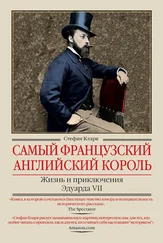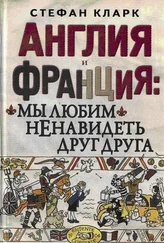Стефан Кларк - 1000 Years of Annoying the French
Здесь есть возможность читать онлайн «Стефан Кларк - 1000 Years of Annoying the French» весь текст электронной книги совершенно бесплатно (целиком полную версию без сокращений). В некоторых случаях можно слушать аудио, скачать через торрент в формате fb2 и присутствует краткое содержание. ISBN: , Издательство: Transworld Digital, Жанр: Старинная литература, на английском языке. Описание произведения, (предисловие) а так же отзывы посетителей доступны на портале библиотеки ЛибКат.
- Название:1000 Years of Annoying the French
- Автор:
- Издательство:Transworld Digital
- Жанр:
- Год:неизвестен
- ISBN:9781407067629
- Рейтинг книги:3 / 5. Голосов: 1
-
Избранное:Добавить в избранное
- Отзывы:
-
Ваша оценка:
- 60
- 1
- 2
- 3
- 4
- 5
1000 Years of Annoying the French: краткое содержание, описание и аннотация
Предлагаем к чтению аннотацию, описание, краткое содержание или предисловие (зависит от того, что написал сам автор книги «1000 Years of Annoying the French»). Если вы не нашли необходимую информацию о книге — напишите в комментариях, мы постараемся отыскать её.
1000 Years of Annoying the French — читать онлайн бесплатно полную книгу (весь текст) целиком
Ниже представлен текст книги, разбитый по страницам. Система сохранения места последней прочитанной страницы, позволяет с удобством читать онлайн бесплатно книгу «1000 Years of Annoying the French», без необходимости каждый раз заново искать на чём Вы остановились. Поставьте закладку, и сможете в любой момент перейти на страницу, на которой закончили чтение.
Интервал:
Закладка:
And this globalization à la française has benefits on a more personal level, too. French managers are usually trained in very academic business schools and then sent to work in companies where any creativity is stifled by a rigid hierarchy and the need to respect workers’ rights. To avoid staleness, the ideal solution is for a French company to send its execs to an overseas subsidiary. There, they can get all the pent-up frustration out of their system by firing inefficient workers and closing down unprofitable factories (both of which are as good as impossible in France), and then return home like crusaders after a rampage amongst the heathens. They will have sated their bloodlust and can now settle down to the more restrained style of management imposed on them by the French unions. In short, foreign workers take the punishment that French managers would dearly love to dish out to their compatriots. Vive la mondialisation .
How do you say faux pas in English?
In 2004, France and Britain continued their eternal tap dance through the minefield of history when they celebrated the centenary of the Entente Cordiale.
In March, the Queen went over to Paris, where President Jacques Chirac provoked a scandal by putting his arm around the royal waist. This perfectly anodyne French gesture was of course interpreted in the British press as a huge Gallic gaffe – the Latin lover trying it on with the monarch – and there was general outrage that France didn’t understand the untouchability of royalty. It wasn’t 1904 that was being remembered, it was 1789.
In June 2004, it was the sixtieth anniversary of D-Day. The Queen was invited to Normandy, along with George W. Bush, who made a speech saying that France was America’s ‘eternal ally’, this just a year after his administration had stood by while the US media called the French every name under the sun.
In July, the British were given a great honour when their soldiers were invited to lead off the Bastille Day military parade. Amongst the regiments that were sent to march through Paris were the Grenadier Guards, who have been wearing bearskin hats ever since they nabbed them from the defeated Gardes impériales at Waterloo. (But then finding an old regiment that had never been in battle against the French would have been nearly impossible.)
And in August, Paris celebrated its liberation with a series of festivities under the banner ‘Paris se libère’ – Paris liberates itself, a line from Charles de Gaulle’s famous ‘Paris libéré’ speech. France’s most serious newspaper, Le Monde , published a forty-eight-page sixtieth-anniversary supplement, which didn’t mention that non-French troops might have taken part in liberating the city until page eighteen. Merci, les amis .
In short, the year 2004 was meant to be special but in fact it was same old, same old.
In July 2005 there was another head-to-head, when Paris and London competed to host the 2012 Olympics. (As we now know, London won and is bracing itself for the financial consequences.)
The two cities’ campaigns symbolized the deep differences between Britain and France. Paris’s 2012 Committee was chaired by the city’s mayor, Bertrand Delanoë, seconded by the then Minister of Sport, Jean-François Lamour, both of whom looked about as athletic as a crème brûlée . Meanwhile, London’s bid was headed by an Olympic Champion, Sebastian Coe.
The Brits made a film that showed youngsters being inspired by the Games to become athletes themselves – a truly Olympic dream. The French, on the other hand, commissioned an arty video that was basically an advert for Paris’s tourist attractions, as if the Eiffel Tower would be competing in the high jump.
On the night before the committee’s vote, Tony and Cherie Blair stayed up schmoozing with delegates in their hotel in Singapore. Jacques Chirac put in an appearance and then went to bed, declining to demean himself by begging committee members for their votes. He also (it is said) cost France the vital support of two Finnish delegates when he was quoted in the press criticizing the Brits by saying, ‘You cannot trust people who have such bad cuisine. It is the country with the worst food after Finland.’
In essence, Paris was so sure of itself that it threw away the bid. Instead of playing the Anglo-Saxon game of really showing how much you want something and going all out for it, the French played hard to get. Even so, they were incensed when they lost. I was invited on to French TV news to watch the announcement live, and sat between a former Ministre du Sport and a newspaper journalist, both of whom exploded with righteous anger when the ‘wrong’ city was chosen. They were such bad losers that I said they were forgetting the Olympic spirit – ‘Paris didn’t lose,’ I suggested, ‘it just got the silver medal.’ The politician turned to me and, live on air, replied, ‘You Anglais think you’re funny, but you’re not.’ Not a very sporting minister.
The Brits show Sarko their London derrière
France and Britain’s non-stop snubbing carried on during the visit to London in March 2008 by President Nicolas Sarkozy and his glamorous wife, the model and chanteuse Carla Bruni. The speech-writers hit exactly the right note, with both Monsieur Sarkozy and Gordon Brown calling for an upgrade of the Entente Cordiale – Sarko suggested an ‘Entente Amicale’, while Brown went one further and proposed an ‘Entente Formidable’.
It was only almost every other detail of the trip that turned into a diplomatic faux pas .
When Sarko gave his speech at the Houses of Parliament, he was taken to the Royal Gallery and shown two of its prize exhibits – immense paintings depicting the French defeats at Trafalgar and Waterloo.
Similarly, when the French first couple arrived in Windsor to visit the Queen, they were greeted by a pair of royal carriages – the Queen and Monsieur Sarkozy were to travel in the first, Prince Philip and Carla in the second. Along the way, the procession was escorted by the Household Cavalry, whose breastplates are copies of those taken from dead French cavalrymen at Waterloo. Also present were men from the Blues and Royals, whose uniform features a golden eagle, in celebration of the capture of French colours at the same battle. And to cap it all, the first horse in the parade was called Agincourt. The French visit to Windsor Castle was being met with a bombardment of historical cannonballs.
The royal banquet at the castle was just as gaffe-strewn. To reach the banqueting hall, the guests had to pass through an antechamber called (what else?) the Waterloo Room, on the walls of which hung two magnificent portraits of ( naturellement ) the battle’s two victors, Wellington and Blücher. By this time, Sarko must have been relieved that they weren’t going to watch a video about tourism on St Helena.
He was smiling politely as he walked to the great table in St George’s Hall, laid for 160 guests. On the table sat a Sèvres porcelain dinner service that, according to a French protocol expert with whom I did a TV talk show on the day after the banquet, was acquired by the British royal family during the French Revolution, when the contents of the Château de Versailles were plundered and sold off on the cheap. The implication was that, in French eyes, the President had been invited to Windsor to eat off his own plates.
Sarko came up with a snub of his own, though. Despite saying in his speech at the banquet that ‘it’s like a dream to stay at Windsor Castle’, he apparently declined the offer of a second night’s B&B and headed back home. One day of historical humiliation was apparently enough.
And is it too far-fetched to speculate that the failure to invite the Queen to the sixty-fifth anniversary of D-Day in June 2009 was France’s reaction to the historical put-downs during the previous year’s state visit? Fair enough, the French were focusing all their attention on Barack Obama, the new political superstar, but how could they have forgotten the daughter of the king who allowed Charles de Gaulle to base his Free French regime in London for four years? The faux pas was explained away afterwards – France had expected the Brits themselves to decide who was on their guest list – but the excuse was about as convincing as one of de Gaulle’s wartime declarations of friendship.
Читать дальшеИнтервал:
Закладка:
Похожие книги на «1000 Years of Annoying the French»
Представляем Вашему вниманию похожие книги на «1000 Years of Annoying the French» списком для выбора. Мы отобрали схожую по названию и смыслу литературу в надежде предоставить читателям больше вариантов отыскать новые, интересные, ещё непрочитанные произведения.
Обсуждение, отзывы о книге «1000 Years of Annoying the French» и просто собственные мнения читателей. Оставьте ваши комментарии, напишите, что Вы думаете о произведении, его смысле или главных героях. Укажите что конкретно понравилось, а что нет, и почему Вы так считаете.












